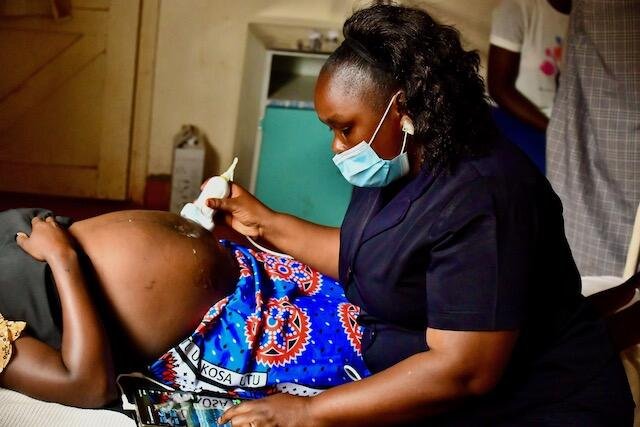Portable ultrasound devices are transforming maternal healthcare in Kenya’s rural areas by enabling earlier detection of pregnancy complications.
This vital technology is enhancing the health outcomes for both mothers and infants, bringing renewed hope to underserved communities.
Namunyak Tajiri, a 37-year-old mother of nine from a remote village in Namanga, has struggled to access healthcare facilities.
Now expecting twins, she feels more hopeful than ever, as she can utilize prenatal services with the assistance of a portable ultrasound device.
In her previous pregnancies, she encountered difficulties, with her third resulting in heartbreak when she lost one of her twins.
Since its launch in November 2020, the UNFPA mobile ultrasound program has trained numerous midwives and screened over 2,500 women across Kajiado, Migori, Homabay, and Kisii counties.
The devices are provided free of charge, enabling midwives to detect pregnancy complications early and significantly lowering the risks of maternal and infant mortality.
Dorothy Kwamboka, a nurse at Namanga Health Centre, expresses concern, stating, “We have women who travel long distances, making transportation a significant challenge. This often necessitates taking the portable machine to them, and when we do get there, power outages can prevent us from performing many scans. Additionally, some women face financial constraints and feel unable to pay.”
The introduction of portable ultrasound technology offers critical medical support, particularly in areas where healthcare is scarce and cultural beliefs may deter pregnant women from visiting hospitals for prenatal care.
Kwamboka highlights that community health volunteers have been instrumental in shifting attitudes among pregnant women.
Thanks to its portable nature, the device has significantly enhanced midwifery services, allowing practitioners to reach remote locations and provide essential care to women far from medical facilities.
They emphasize the significance of scans and the advantages of early planning to prevent complications.
According to Pilar Molina, who specializes in Sexual and Reproductive Health and serves as the UNFPA Deputy Representative for Kenya, Africa is struggling to meet maternal mortality targets for several reasons.
She points out the critical issues of adolescent pregnancy and child marriage.
The introduction of new technology can be highly beneficial, as it aids in detecting complications in likely high-risk pregnancies, allowing for timely referrals and the necessary level of care.
An ultrasound scan costs Ksh 500 ($3) for patients, identical to the price in public hospitals, while private hospitals charge about Ksh 1500.
The facility is capable of performing up to three scans per day when adequately staffed.
Pregnant women are given information regarding the positions of the baby and placenta, which assists in deciding between a normal delivery and a caesarean section.
Additionally, medics can spot issues like breech positions early and identify the baby’s gender.
Ongoing education for women, men, and children about the significance of prenatal care enhances maternal and infant health outcomes in these communities.
The UNFPA indicates that in Kenya, 355 women die from pregnancy-related causes for every 100,000 live births.
This results in approximately 5,000 women and girls losing their lives each year from complications related to pregnancy and childbirth.

